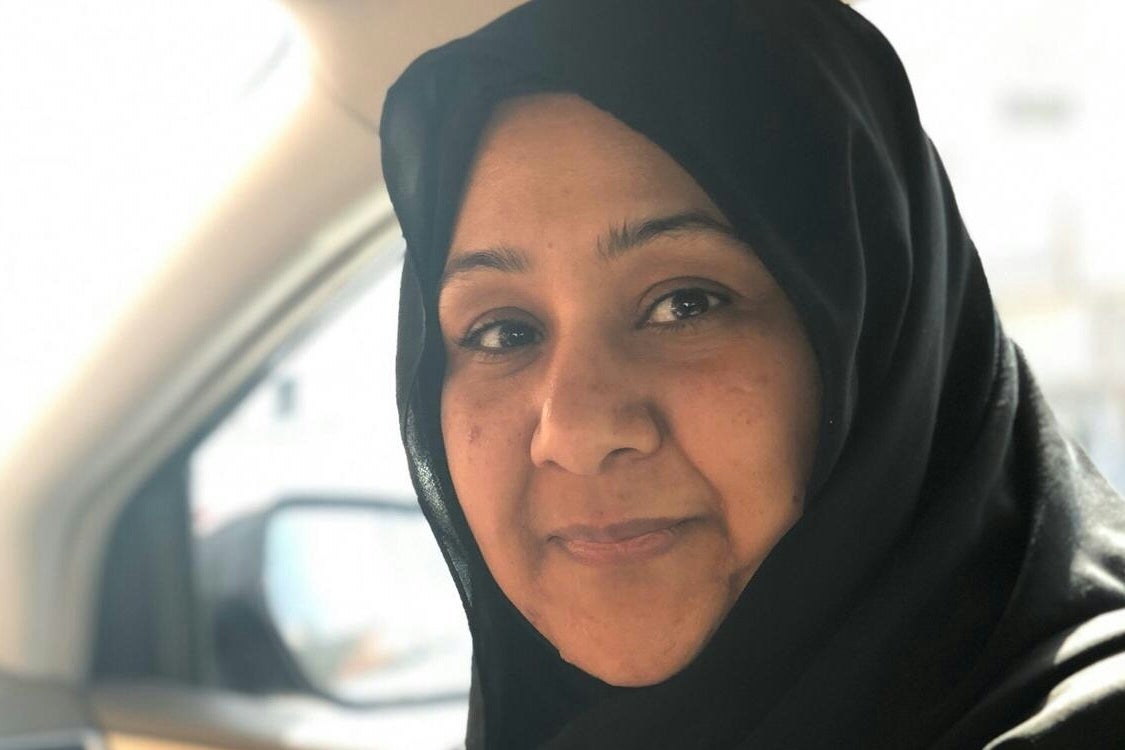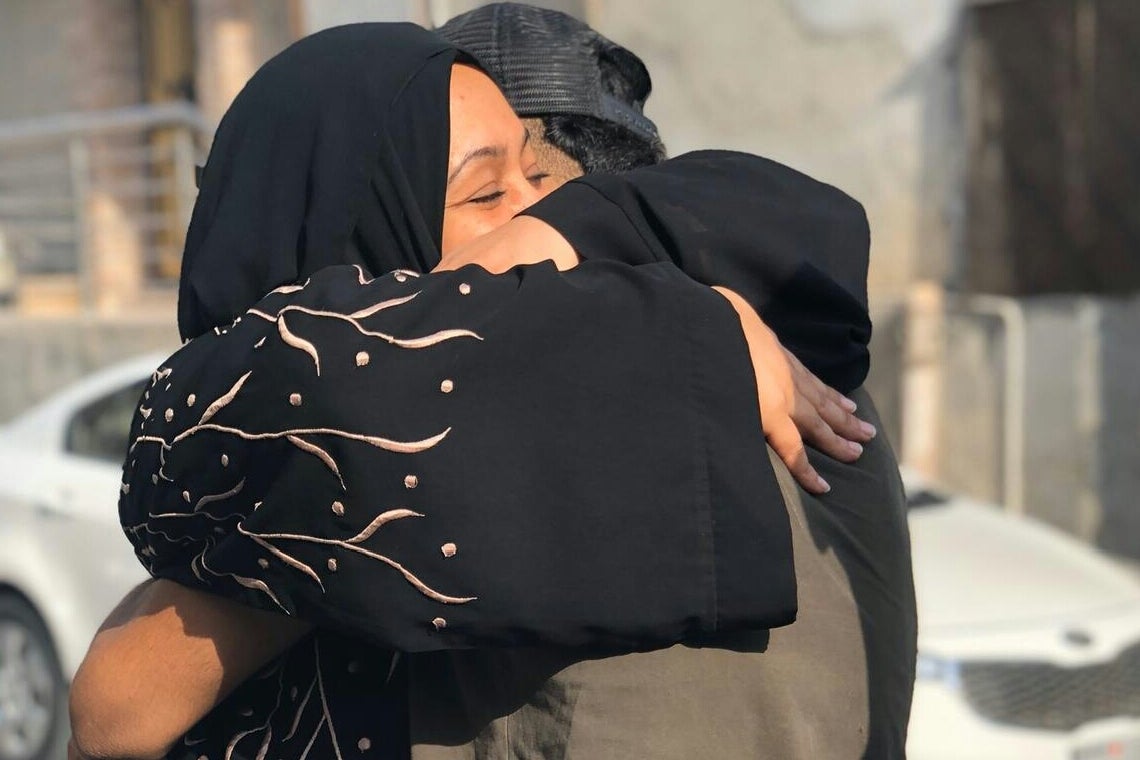Bahraini activist jailed after criticising Formula One ‘considered suicide’ after rape and abuse by authorities
Exclusive: ‘I was shocked the person who was the head of police station where I was sexually assaulted and tortured was the beneficiary of a British taxpayers scheme,’ says Najah Yusuf

A Bahraini activist who was jailed after criticising Formula One’s Grand Prix in the country has said she contemplated suicide after suffering rape and abuse at the hands of the state’s authorities.
Najah Yusuf, a former civil servant who was fired over her jail sentence, was imprisoned in April 2017 after condemning the Bahrain Grand Prix and human rights abuses in the wealthy Gulf state on Facebook.
The mother-of-four, who was pardoned and freed from prison in August, said she still lives in fear of being forced to return to jail at any moment.
The 42-year-old, whose treatment has been denounced by the United Nations, called for Formula One and Lewis Hamilton to acknowledge the human rights violations she has suffered and urge the authorities to launch an investigation into her treatment.
“Formula One should not be racing in a country when abuses occur,” she told The Independent in her first interview since leaving jail. “I was concerned about this and the government’s attack on freedom of expression and their treatment of protesters and citizens so I spoke out.”
Ms Yusuf said she was called into the police station with her 14-year-old son and a member of the Bahraini intelligence services forced her to unlock her mobile phone before interrogating her about her involvement in politics.
She said: “I was terrified for my own safety and that of my son. I was asked to work with the authorities as an informant but I refused. Their attitude totally changed then. They became very aggressive. Over the next four days, I slept at home but would go back to the Muharraq police station each day where officers beat me and threatened me with rape.
“They also threatened to kill me and told me they would kill my children. They said they would fabricate an accident which happened to the children but kill them – saying ‘everything will look normal. We can do this to you’.
“While being interrogated in police custody, I was also raped. My dignity was destroyed. At one point I was thinking of killing myself and throwing myself from a window so I could end the suffering. But I thought even though they are already keeping me in hell, I do not want to kill myself. I was shocked the person who was the head of police station where I was sexually assaulted and tortured was the beneficiary of a British taxpayers scheme.”

Ms Yusuf voiced outrage the British government had sent a delegation of Durham Police to the station where she alleges she was sexually assaulted – saying this feels like a “betrayal”.
Although there is no suggestion that Brigadier Fawaz Hassan Al Hassan was involved in abusing her, or sanctioned any such abuse, he was officially in charge of the police station at the time and is the most senior police officer in the area.
He has carried out training in the UK which the British taxpayer footed the bill for as part of a £16,000 programme on “command and control”. A spate of incidents of abuse are alleged to have taken place at the station under his watch.
Ms Yusuf said she was on her period during her first day in Isa Town detention centre and asked for sanitary products and soap to have a shower but was refused. Ms Yusuf said the conditions there felt like an “extension of the torture from the police station” and prison guards would scream and swear at her.
Her cellmate who is also a political prisoner, Hajer Mansoor, had to go to hospital after being assaulted by prison guards last September and was left with bruises all over her body, Ms Yusuf said.
She added: “We felt very vulnerable that we could be attacked at any time by the prison after that and there would be no consequences for their actions. I was only allowed to see my family once from September 2018 until I was released in the summer.”
Ms Yusuf’s 85-year-old father-in-law Mansoor Salman died from suffocation in 2012 after heavy amounts of tear gas was fired into their local area.
Bahrain, which has been ruled by the Al Khalifa family for more than two centuries, is “one of the Middle East’s most repressive states” according to US NGO Freedom House.
The UK has licenced £105m worth of arms to Bahrain since the pro-democracy Arab Spring uprising started in February 2011, according to the Campaign Against Arms Trade.
Bahrain is one of the UK’s longest-standing allies in the gulf and Britain has a lengthy history of colonial intervention – as well as still having naval facilities there.
The Bahrain Grand Prix was cancelled back in 2011 due to widespread protests over human rights abuse in the country but has gone ahead every year since then.
Sayed Ahmed Alwadaei, director of the Bahrain Institute for Rights and Democracy (Bird), said: “As if spending over two years arbitrarily imprisoned was not enough, upon Najah’s release she has faced the further insult of being dismissed from her job. To this day, she has received no redress and there is no indication that Bahrain intends to hold her abusers to account. The UN ruling has confirmed manifold violations against Najah Yusuf, from the breach of her right to freely criticise, to her unlawful torture, sexual assault and unfair trial.”
A spokesperson for Formula One said: “We have always been clear with all race promoters and governments with which we deal worldwide, including Bahrain, that we take violence, abuse of human rights and repression very seriously. At all times throughout this case we have engaged with relevant parties and made proactive enquiries into Ms Yusuf’s situation. We have done this within the constraints of being a private business, without the powers of investigation (in terms of authority, resource and official channels) to fully uncover all the facts.”
A spokesperson for the Bahraini embassy in London said Ms Yusuf’s claims of mistreatment were fully investigated by the Kingdom of Bahrain’s independent Ombudsman and they found no evidence to support their claims. They said she was convicted of terror offences.
“The conviction of Najah Yusuf has no connection whatsoever to the Formula One race, nor to any other freedom of expression issues,” the spokesperson added.
Join our commenting forum
Join thought-provoking conversations, follow other Independent readers and see their replies
Comments
Bookmark popover
Removed from bookmarks